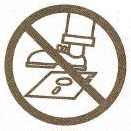|
A huge problem is that "no-self" is not a very good translation. There is a self. There is no intrinsic self identity, that is, the self that exists is not inherently that self. It possesses nothing that makes it "that self" that is unchanging. There very much is a self, but that self exists through interdependent origination, not through spontaneously arising. English simply doesn't do justice to the concept with the quick words for it. We're very quick to take things like no self, no soul, no identity, and so on, and to extrapolate that to a nihilistic position. This is not correct. There is a self. You can look at your body and go "this is a self." That's fine! What's wrong is to cling to that self as unchanging, to believe that that self is "real" in the sense that it will always be real. The Western concept of an eternal, unchanging, intrinsic soul that comprises the self is what is in question here, not the day-to-day concept of self. After a sense, sure, a "self" is a useful fiction, because it is not inherent or intrinsically true. It's "real" only in the relative sense, but not in the absolute sense. Still, this relative truth should not be discarded simply due to translation error. The idea of a literal rebirth becomes much more consistent when we recognize things in this way. Rather than saying "well, there is no sense, therefore there is no self to be literally reborn," we can look at it as "there is this self, that is in a constant state of change. One change that this self will undergo is death. Another change that this self has already undergone is birth. After death, this self will undergo yet further changes." The self is never the same. It lacks intrinsic identity. It is wrong to see it as one thing, as a Noun which exists of-itself. It is phenomenal, not noumenal. It might be argued that this is essentialism. "There is still a self then!" Well, there is a self, but it's hardly the same. Look at your own self. You were born a tiny infant. Was that infant you? How could it not be? Is that infant still you? Certainly not! You will become old and die. Is that old person you? That dead person? Not right now! So where is the "self?" How is it unchanging? And so on. My lama explained mindstream to me this way: a mindstream should not be considered as a stream in that it goes from one place to another. Rather, consider it this way: if you look at a stream from day to day, it will appear the same. We might go "oh that is the same stream" every time. But the water that fills that stream is constantly changing! How can we say it is the same stream when none of the constituent parts, the individual parts of water, are the same? So it is with mindstreams. The mindstream perpetuates from birth to birth, but it too is changing as its constituent aspects change. To get metaphysical with it, HHDL is an emanation of Avalokitesvara. There are other emanations of Avalokitesvara. There are past Dalai Lamas. This Dalai Lama is not his past Dalai Lamas. They aren't the same beings. He does not have memories of "past lives" in that very Western sense. He does report occasionally having a recognition, or familiarity, but it's not like Tenzin Gyatso is literally Thubten Gyatso in a new body, who is literally Trinley Gyatso, and so on. That's not how it works. Same mindstream, different beings. Different water, same stream.
|
|
|
|

|
| # ? May 15, 2024 19:10 |
|
Paramemetic posted:A huge problem is that "no-self" is not a very good translation. There is a self. There is no intrinsic self identity, that is, the self that exists is not inherently that self. It possesses nothing that makes it "that self" that is unchanging. There very much is a self, but that self exists through interdependent origination, not through spontaneously arising. I think this is a good explanation. The idea of a self is useful when discussing things in terms of "conventional" reality. We have to talk about us and our characteristics. It is just the idea of a self that possesses inherent characteristics that persist in and of themselves that goes against the teaching. quote:
I forgot who it was giving the talk, but some monk or teacher I was listening to a long time ago mentioned an analogy similar to the river idea. To paraphrase very roughly he said something like "When you understanding anicca (impermanence), you realize you can't step into the same river twice. The same river isn't ever there. When you fully realize anatta and emptiness, you understand you can't step into the same river even once"
|
|
|
|
Prickly Pete posted:I think this is a good explanation. The idea of a self is useful when discussing things in terms of "conventional" reality. We have to talk about us and our characteristics. It is just the idea of a self that possesses inherent characteristics that persist in and of themselves that goes against the teaching. This is interesting as it sounds similar to the other things the teachings talk about us getting attached and clinging too. Prickly Pete posted:I also think that tangling over rebirth is always a good opportunity to come back to the Simile of the Arrow, and to realize that you don't have to swallow every ounce of the teaching to start on the path at first. Just start meditating and you'll be surprised at how certain things you previously doubted can start to make sense in your calmed and focused mind. I like this and have experienced it myself over a short time frame. Before I started mediating I had very serious problems with Karma and Rebirth, but it was all just a lot of close-mindedness and attachment to old views. There is still work to go, but these things are much more workable for me now. Prickly Pete posted:I think if the only way you can come to terms with the idea of rebirth is to accept it as a metaphor for momentary changes in consciousness, that is as good a place to start as any. I think the problem comes when people start to project their interpretation onto the Buddha's actual teachings, and start making claims like "the Buddha didn't actually teach rebirth or any kind of metaphysical elements in the Dhamma", which has unfortunately become an increasingly prevalent view among secular Buddhists. Yup, we've run into this before in the thread too. There's a lot of attachment to old views on the part of the people perpetuating these interpretations, I think. The thought sounds like, "We live in an empirical world and therefore everything must be scientific and annihilationist." I agree with some of this, it is important to use empirical and critical methods, otherwise we can get ourselves into a lot of trouble. The problem is that with such things it's pretty much impossible to do so directly, however it is possible to evaluate the spirit of the ideas and see if this causes or reduces harm, and work from there. Here's a good essay about this, that really helped open my eyes on this: http://www.dhammatalks.org/Archive/Writings/Rebirth_v111219.pdf . As I've said in past discussions on this, I still think having an open mind is the most important thing.
|
|
|
|
Razage posted:Here's a good essay about this, that really helped open my eyes on this: http://www.dhammatalks.org/Archive/Writings/Rebirth_v111219.pdf . As I've said in past discussions on this, I still think having an open mind is the most important thing. That's the exact essay I just linked. I'm getting good at Buddhism, or not.
|
|
|
|
standardtoaster posted:That's the exact essay I just linked. I'm getting good at Buddhism, or not. Haha, whoops, I should have checked to see if it was linked in the thread before. Well, now there's two chances people will find and read it, it's a good essay!
|
|
|
|
On the topic of rebirth, taking a scientific stance is helpful I think. Let's say that consciousness is a non-metaphysical process, let's say it's like an ordinary physical process. Okay, so how many things in our physical universe happen once and then never happen again? Just take any physical thing going on in the universe, as far as we know, that's going to be some process repeating itself. Stars are made, they blow up, dust collects and new stars are born. Trees grow, they die and rot, new trees grow. Wolf eats the rabbit, wolf dies, grass grows being fertilized from wolf carcass, rabbit eats grass, etc. I mean, look at any physical phenomena and it's going to be some sort of process looping around. Just taking into account what seems to be the basic trend in the universe, it would be extraordinary if consciousness* was the one process that happened only once and then was gone forever. That would actually go against everything we know (scientifically) about the universe. So if you're willing to think non-metaphysically about consciousness, it seems to me that rebirth makes the most sense as a default stance. *the experience of being a 'you', subjectively experiencing existence.
|
|
|
|
Razage posted:Haha, whoops, I should have checked to see if it was linked in the thread before. Well, now there's two chances people will find and read it, it's a good essay! I think I may have linked that same article at some point as well, or else the one by Bhikkhu Bodhi, but they both bear repeating. I am pretty sure that same piece by Thannisaro is at Access to Insight. He is a great resource and his take on rebirth is a nice counterpoint to some of the materialist interpretations that come up in these discussions. I think it is worth mentioning that a metaphorical interpretation is by no means a roadblock to getting started on the path. Your meditation will still be just as fruitful. Your adherence to the precepts will still be beneficial. I know for certain that there are people at my sangha who dwell on these same issues in terms of rebirth. Don't let it keep you from examining the conditions that lead to suffering. Take the medicine, see how you feel, and worry about the details when your mind is calmed and focused.
|
|
|
|
I wanted to toss this request out to the Mahayana people here before I forget - I have been wanting to read more about emptiness as it has been elaborated on much more heavily in those traditions, so if anyone has any articles, books or sutras that they recommend I would be very interested.
|
|
|
|
Rhymenoceros posted:In my experience, compassion does not lead to sorrow. Sorrow is perhaps, due to a misunderstanding? There is suffering in this world, but sorrow over suffering is just more suffering. If it's not compassion towards animals that causes me to suffer because of their suffering I don't know what is. Suffering of animals causes me these negative emotions because I care about them, how else could it be? quote:It may be helpful to contemplate what compassion is; what does compassion feel like. From my own experience, thinking about the suffering of people and animals, compassion is always followed by a strong urge or wish; "May you not suffer, may you find ease from this suffering, may you be well, may you be happy." To me at least, it seems that loving kindness is never far away from compassion, so ultimately I think compassion is free from unpleasantness. Hmm. When I think about suffering of animals and people, that kind of wish does not follow. Instead what follows is this choking thought or feeling: "I can't do anything about this suffering, it exists and it is awful but nothing can be done about it. Looking at it will only drown me under it." So it's best to try to look away, even though I know it continues to exist. For example one memory from my visit to Russia causes me grief still, even though it was 2,5 years ago. It was a hot spring day, maybe even +30 Celsius and I was walking outside under a balcony when I heard a strange noise. Three hours later I was walking the same way and this noise came again. I looked up and there was a beautiful big cockatoo on the balcony, straight in the sun, in a cage way too small. I felt devastated. For how long had it been in the sun without food or water in that too small cage? And what could I do to save it? I contemplated going to the door, knocking and offering to buy the poor animal from the owner (if they were home), but what then? There was nowhere I could take it, I didn't even live in Russia and if I released it to the wild it would've most probably died.  quote:It is great to have such sympathy towards animals, but maybe you should try to investigate your perspective; why is your response distress and sorrow? It seems like this might not be the right response, as you are also a being who should not suffer. Meditate and investigate Thinking about suffering of others and how they shouldn't suffer comes much easier for me than thinking the same things about myself. Also, I originally started meditating to cope with my anxiety, so I haven't dared to meditate on thoughts that might cause me anxiety very much. But I feel I might be ready for that too bit by bit. Razage posted:In Shambhala, this is called the "Joyful Heart of Sadness." A very complex notion and I make no claim to understand it completely myself. The issue isn't having too much compassion, that's the notion that gets us caught in close-mindedness. "Oh, I care TOO much about the animals and it hurts me. Therefore the solution is to close myself to their suffering and then I don't feel so bad." It's a slippery slope that can easily lead to a misanthropic view of the world, and causes much more suffering. Heh, I've teetered on the verge of that slope too many times. I've just been too compassionate to slide down it. Could you point me some reading about this Joyful Heart of Sadness? Googling it brought up nothing. I'm very interested in hearing about it, since nowhere have I been able to read about this particular cause for my suffering.
|
|
|
|
What's the etiquette of if you know somebody from the street and go to a Buddhist temple and see them as a monk there? I know he has some Buddhist monk-name now, but I only know his street name. He pours out tea for everyone at the end of the dharma talks. Is it cool to be like, "Hey, ____, how are you?"
|
|
|
|
ashgromnies posted:What's the etiquette of if you know somebody from the street and go to a Buddhist temple and see them as a monk there? Yeap, I'd just follow with "and do you have something else you'd like to be called?"
|
|
|
|
Rurik posted:Heh, I've teetered on the verge of that slope too many times. I've just been too compassionate to slide down it. Could you point me some reading about this Joyful Heart of Sadness? Googling it brought up nothing. I'm very interested in hearing about it, since nowhere have I been able to read about this particular cause for my suffering. Trüngpa talks about it in chapter three of Shambhala: Sacred Path of the Warrior. There's a lot of stuff about what you're talking about in there actually. 
|
|
|
|
So if I were to attend a Buddhist meeting, is it better to have done a lot of reasearch prior, or can you just kinda show up?
|
|
|
|
Rurik posted:If it's not compassion towards animals that causes me to suffer because of their suffering I don't know what is. Suffering of animals causes me these negative emotions because I care about them, how else could it be? It's called the genuine heart of sadness, not joyful.
|
|
|
|
Rurik posted:If it's not compassion towards animals that causes me to suffer because of their suffering I don't know what is. Suffering of animals causes me these negative emotions because I care about them, how else could it be?  If someone saw my suffering, and they felt compassion, sympathy, loving-kindness towards me, then at least my suffering would have caused some good in the world. Sometimes without even knowing it, we think that we can make up for bad things by punishing ourselves with negative thoughts and emotions, but that's really just more suffering. Kindness, compassion and forgiveness are the only intentions that can create positive outcomes for us. Rurik posted:Hmm. When I think about suffering of animals and people, that kind of wish does not follow. Instead what follows is this choking thought or feeling: "I can't do anything about this suffering, it exists and it is awful but nothing can be done about it. Looking at it will only drown me under it." So it's best to try to look away, even though I know it continues to exist. Rurik posted:Thinking about suffering of others and how they shouldn't suffer comes much easier for me than thinking the same things about myself. I think people tend to think that they're worse than everyone else, and don't deserve compassion or kindness. Thinking that you're worse than others is a conceit specifically identified (IIRC) by the Buddha as delusion. Rurik posted:Also, I originally started meditating to cope with my anxiety, so I haven't dared to meditate on thoughts that might cause me anxiety very much. But I feel I might be ready for that too bit by bit. I sincerely hope and think you will be able to cope with your anxiety eventually. May you find refuge from anxiety and the stress that causes.
|
|
|
|
PrinceRandom posted:So if I were to attend a Buddhist meeting, is it better to have done a lot of reasearch prior, or can you just kinda show up? Do some research on the group or call/email someone about it if you can. It'll be easier to show up with a little bit of knowledge about the group. Their tradition, who the teachers are, what their experience is, etc.
|
|
|
|
A lot of Buddhist temples or monasteries or lay groups or whatever will have some kind of class or program that is aimed at beginning meditation or learning the basics or the tradition. If that is an option it can be a great way to informally visit the place and get a feeling for how they do things.
|
|
|
|
Leon Sumbitches posted:It's called the genuine heart of sadness, not joyful. Haha, that was my fault. I get these things confused sometimes.
|
|
|
|
Rhymenoceros posted:
Do you have any book recommendations? I've been working on this for a while but that door is still firmly shut for me. I'm becoming more and more mindful of when I'm being a dick to myself at least, it's pretty disturbing. No wonder I'm stressed and anxious if I even interpret hanging out with friends as a sign of my undesirable character: "Ugh, you're such a selfish rear end in a top hat for forcing your presence on people JUST because you miss your friends and want to hang out and cook them a nice dinner." 
|
|
|
|
PiratePing posted:Do you have any book recommendations? I've been working on this for a while but that door is still firmly shut for me. I'm becoming more and more mindful of when I'm being a dick to myself at least, it's pretty disturbing. No wonder I'm stressed and anxious if I even interpret hanging out with friends as a sign of my undesirable character: "Ugh, you're such a selfish rear end in a top hat for forcing your presence on people JUST because you miss your friends and want to hang out and cook them a nice dinner." Sounds like you're becoming more aware of your thought processes, which I'd say is a good thing. Might be disturbing and painful at first, but as a favourite author of mine wrote, "pain is the breaking of the shell that encloses our understanding". I think awareness could be the first step to positive change. Maybe now that you're becoming more aware of your negative thoughts and realizing that they are illogical and depressing, you could begin to challenge them. Perhaps you could attempt to change the thoughts, by replacing them with more rational and positive ones. I'm not sure whether this is in line with Buddhist philosophy, but I'm pretty sure they teach it in cognitive behavioral therapy, which is often combined with mindfulness meditation and shown to combat anxiety and depression. I have a question about meditation. I've been doing mindfulness daily for 2 months or so now -- 20 minute sessions, once per day. I feel great. Much more relaxed, joyful, spontaneous, and self-aware. I'm considering doing two sessions per day, but just wondering if doubling my meditation time could possibly be "too much". The reason I ask this is because for about a week, I combined my normal mindfulness practice with additional mantra meditation. And it made me feel great, but also a little bit "spacey", slightly depersonalized, so I stopped. Anyone ever experienced effects such as this from "over-meditating", or through combining multiple forms of meditation? I'm also going to experiment to see what works, because I'm sure it can be different for everyone. I would be interested in hearing people's thoughts nonetheless. Cheers!
|
|
|
|
Don't worry about "over meditating". Think that in certain retreats, they meditate for 9 hours a day ! Usually, in zen at least, teachers recommend to have two 40 minutes zazen session per day, either one after the other or one in the morning and one in the evening. Brad Warner, who is a serious zen practicioner and teacher, says in his books that he puts in one hour a day : 40 minutes in the morning, 20 minutes before going to bed. So don't worry, two sessions of 20 minutes per day is far from over meditating. If i were you, i would do one first thing in the morning as i wake up, and before going to bed or after coming back from work. It really gives you space in your day. Finally, just try it, and you will see if you like it or not. There is no problem in meditating for short amounts of time. When i begun i was meditating 12 minutes a day, and nowadays i tend to practice 25 minutes in the morning, and 25 in the evening. But if i don't feel like it, i may shorten the whole thing. Don't try to think too much about this, it's really not that important. Meditation should not be a pressure !
|
|
|
|
PiratePing posted:Do you have any book recommendations? I've been working on this for a while but that door is still firmly shut for me. I'm becoming more and more mindful of when I'm being a dick to myself at least, it's pretty disturbing. No wonder I'm stressed and anxious if I even interpret hanging out with friends as a sign of my undesirable character: "Ugh, you're such a selfish rear end in a top hat for forcing your presence on people JUST because you miss your friends and want to hang out and cook them a nice dinner." First some things that are good to know: Our brain is constantly coming up with random thoughts. Some are disturbing, some are pleasant, some are irrelevant. When our brain gets fixed in a habit of repeating a particular thing, like "I'm a selfish rear end in a top hat", in time we tend to believe that. This is just because in general we end up believing things we're told over and over again. So, negative thoughts are just habits, they're no more special than any other habit, like picking your nose too much. We're just going to replace a habit with a more constructive one. Thoughts that are repeated over and over become beliefs with time. IMO the best way to challenge a belief is to use logic. What worked for me was whenever I noticed I was putting myself down, I asked myself "Would I say this to another person in the same situation?" The answer has always been "Of course not, saying this would be unfair, mean, hurtful, unhelpful and fundamentally untrue." A practical example from my life has been when I've been studying and I've struggled to learn hard material, I would think "You'll never understand this, you're not smart enough." Here I would stop myself, and imagine if someone else came to me and said "I'm trying to learn this hard material, but I'm not getting it" I know I would never, ever say "You'll never understand this, you're not smart enough." to this person, because I know this person just needs to have it explained correctly, I know that his low confidence is hindering him, I know that this person needs encouragement and kindness to actually get results. I know that in real life, punishment doesn't lead anywhere, so why bother with punishment? Perhaps you can try this in your own life. In the situation you described in the post I've quoted, if you imagine for example a good friend of yours coming to you and saying "Sometimes I say to myself, I'm such a selfish rear end in a top hat for forcing my presence on people JUST because I miss my friends and want to hang out and cook them a nice dinner." Understanding what it feels like to feel like this, what would you say to your friend in response? For me this has been a good litmus test for my own thought patterns. If I would not say it to someone else (because it would be unhelpful and hurtful, but most importantly plain untrue), I'm not going to say it to myself. I repeated this process whenever I notice a negative thought about myself. Also, don't worry about the content of your thoughts, yes you probably (like me) will discover a lot of disturbing thoughts, but they're just thoughts. Don't take thoughts so seriously. Your brain literally can't stop generating this random input. Learn to love your zany brain!  All this is basically what davidcm has suggested I think. There are tons of skillful ways to combine mindfulness and cognitive behavioural therapy, so don't be afraid to find what works for you. Rhymenoceros fucked around with this message at 22:37 on Nov 18, 2013 |
|
|
|
Ugrok posted:Don't worry about "over meditating". Think that in certain retreats, they meditate for 9 hours a day ! This is good advice. Develop the habit of daily meditation, and don't slough it off. You brush your teeth every day, bathe every day (hopefully), how much more vital is mental hygiene than physical?
|
|
|
|
Thanks for the advice re: meditation! I've been contemplating the mild sense of depersonalization that I felt when I started the mantra practice in conjunction with mindfulness, and in retrospect I think it was actually just a lifting out of depression. Perhaps it felt unusual to me -- and I didn't feel like I was quite "myself" -- because I wasn't used to feeling so joyful, haha. Now that I'm becoming more used to positive feelings, they feel much more normal to me. It's crazy how much better I feel after only a few months of meditating. I always knew conceptually of the benefits, but to actually experience them is something different completely. Mr. Mambold posted:How much more vital is mental hygiene than physical? I love that they're both intertwined and feed into one another, like a positive feedback loop. You feel better, and that makes you take better care of yourself (physically and mentally), which makes you feel better... Rhymenoceros, I think you're spot-on about positive self-talk and viewing yourself as a friend.
|
|
|
|
My teacher always said to me that any suffering i encountered during meditation was just something *I* brought, not the meditation. Meditation does not hurt or cause suffering. It's just sitting. If you feel bad during or after meditation, it's because of what YOU bring to the meditation. Even physical pain is something you can choose to experience as suffering, or not. By practicing you will slowly learn to bring less and less to the meditation, and to just let things be as they are. It's no easy task because we are so attached to what we think we are, even our very suffering has a meaning for us that is hard to let go. Great about the positive feelings ! Be careful not to get over attached to them, though. Positive feelings and negative feelings are the same thing in the end : just feelings. If you attach to the good feelings, whenever your life seems to turn lovely (as it happens to all of us, of course, from time to time), you will feel completely let down and may be disgusted in your practice. Practice is not about feeling good, or bad. It's just sitting with what is there, with no judgement. Of course, if you feel great, enjoy !
|
|
|
|
Thanks Ugrok, good points. I'm doing meditation from a non-demoninational point of view rather than Buddhist, but I agree with you about getting too attached to positive emotions. Now that you mention it, lately I have found myself mildly disappointed when I don't feel great. I guess it adds unnecessary suffering.Ugrok posted:Practice is not about feeling good, or bad. It's just sitting with what is there, with no judgement. Reminds me of a quote from the guided meditation that I used to learn mindfulness: "the aim is not to feel better, but to get better at feeling".
|
|
|
|
Rhymenoceros posted:I don't have any book recommendations, all I have is my own experience which I will share. Happily I'm not as bad as that anymore. I've been doing pretty much what you've said for about a year now and in the past few months I've been starting to really feel some fundamental changes. I've tried cognitive behavioural therapy for a while but it didn't feel complete to me. These days I'm much more mindful of my thoughts/emotions and my anxiety doesn't control me anymore. Negative, unskillful thoughts feel more and more shallow and don't get acted on most of the time. I have quite a way to go because accepting that I'm not fundamentally wrong is new territory for me, I never learned how to feel self-compassion so it needs some time to develop. I'm doing well in that deartment too, the past few months there has been a different base quality to how I feel, a kind of steady, quiet and composed feeling that I can draw on whenever. Strong back
|
|
|
|
If any of y'all are woodcarvers: trying to say one prayer or whatever you prefer per piece of wood removed has been a really interesting practice.
|
|
|
|
I was just early-gifted a copy of the Dhammapada; Is there a recommended reading order or should it just be gone through cover to cover?
|
|
|
|
PrinceRandom posted:I was just early-gifted a copy of the Dhammapada; Is there a recommended reading order or should it just be gone through cover to cover? I would just start with Pairs and keep on going.
|
|
|
|
I don't really mean this to be E/N stuff or anything, but is there any Buddhist literature or teachings on death anxiety? I've been going through about 3 months of serious depressive death anxiety after falling out with Christianity (not to disparage it; I'm still fond it in my own way). I guess I also don't want to just jump into another religion out of fear of annihilationism.
|
|
|
|
PrinceRandom posted:I don't really mean this to be E/N stuff or anything, but is there any Buddhist literature or teachings on death anxiety? I've been going through about 3 months of serious depressive death anxiety after falling out with Christianity (not to disparage it; I'm still fond it in my own way). I guess I also don't want to just jump into another religion out of fear of annihilationism. Tibetan Book of the Dead (worth reading) Tibetan Book of Living and Dying by Sogyal Rinpoche (a "guided version" if I remember right)
|
|
|
|
PrinceRandom posted:I don't really mean this to be E/N stuff or anything, but is there any Buddhist literature or teachings on death anxiety? I've been going through about 3 months of serious depressive death anxiety after falling out with Christianity (not to disparage it; I'm still fond it in my own way). I guess I also don't want to just jump into another religion out of fear of annihilationism. There are tons. Also, you can be a Christian and a Buddhist at the same time if you want. Buddhism is non-theistic and it's perfectly acceptable to follow Buddhist teachings as well as believing in God, heaven, hell, etc. Concepts of heaven and hell are also addressed in several forms of Buddhism. Just find your own path. http://www.ernestbecker.org/index.php?option=com_content&view=article&id=271:the-development-of-the-self&catid=9:audio-materials&Itemid=32 http://www.urbandharma.org/udharma5/viewdeath.html http://www.accesstoinsight.org/lib/authors/walshe/wheel261.html http://www.buddhanet.net/deathtib.htm http://www.sgi.org/buddhism/buddhist-concepts/the-eternity-of-life.html http://www.daisakuikeda.org/main/philos/essays-on-buddhism/buddh-lifedeath.html http://www.amitabhahospice.org/public/spiritual_support/teachin1.php http://zmm.mro.org/teachings/the-question-of-life-and-death/ standardtoaster fucked around with this message at 17:34 on Dec 3, 2013 |
|
|
|
I, even with my "fake" Buddhism, am going to have to disagree with the idea that you can be Buddhist and Christian at the same time. As far as I know, this view is only espoused by people that consider Buddhism to be "more of a philosophy than a religion". The biggest, easiest to see conflict is this: In Christianity, the only salvation is through Christ. In Buddhism, Nirvana can be attained only through understanding the the Dharma and following the 8-fold path. While Buddhism has no issue with the existence of gods, they explicitly cannot be the path to salvation/Nirvana. However, that is not to say that a Christian cannot learn and benefit from Buddhist teachings. The reason that Buddhism if often considered a philosophy by some people is that many of the ideas of Buddhism are just all around good ideas. I'm not trying to discourage or dissuade anyone from learning from the Dharma, but I think it is important not to pretend that conflicting ideas are compatible.
|
|
|
|
Longtime lurker with a question!Snak posted:However, that is not to say that a Christian cannot learn and benefit from Buddhist teachings. The reason that Buddhism if often considered a philosophy by some people is that many of the ideas of Buddhism are just all around good ideas. I'm not trying to discourage or dissuade anyone from learning from the Dharma, but I think it is important not to pretend that conflicting ideas are compatible. The impression I get from this thread, and other sources, is that while Buddhism is still a complete religious identity in its own right, it's not monolithic in the way the monotheistic faiths are. As in, if you try to incorporate bits of the Quran into whatever your spiritual deal is while denying Allah, most Muslims would insist that you're wrong and Islam must be taken as a whole. Same goes for Christianity. Meanwhile, Buddhists seem to be much more okay with a fragmentary or syncretic approach, especially since small, gradual steps towards Nirvana are a thing (unlike with salvation) and every part of the teachings and practice is considered beneficial. It's just not OK to call yourself Buddhist if you do that since it subverts the idea of what Buddhism is. Is this at all accurate or another dumb stereotype?
|
|
|
|
Snak posted:I, even with my "fake" Buddhism, am going to have to disagree with the idea that you can be Buddhist and Christian at the same time. As far as I know, this view is only espoused by people that consider Buddhism to be "more of a philosophy than a religion". So, you believe salvation and nirvana share the same definition? Christianity a. Deliverance from the power or penalty of sin; redemption. b. The agent or means that brings about such deliverance. Buddhism a. The sutta pitaka version? b. The pali canon version? b. Paranirvana? c. Theravada version? d. Mahayana version? e. Are concepts of samsara and nirvana dualistic or non-dualistic? d. Just the end of suffering? How do you know which is the correct definition? Who is right? So, you can't be delivered from sin and obtain nirvana?
|
|
|
|
standardtoaster posted:So, you believe salvation and nirvana share the same definition? This is interesting. I'm out of my depth here, but I will enjoy thinking about this. Thank you.
|
|
|
|
If you are going to claim to be a Buddhist and a Christian, then you are going to end up neglecting or ignoring pretty fundamental portions of one faith or the other. The idea of a fixed soul which, upon dying once, is transferred to some divine realm for all of eternity is completely at odds with what the Buddha taught.
|
|
|
|
Prickly Pete posted:If you are going to claim to be a Buddhist and a Christian, then you are going to end up neglecting or ignoring pretty fundamental portions of one faith or the other. Not to mention that the Buddha rejected the concept of a creator God.
|
|
|
|

|
| # ? May 15, 2024 19:10 |
|
Pepsi-Tan posted:Not to mention that the Buddha rejected the concept of a creator God. The Buddha speaks about (and speaks to, in some suttas) Brahma, but Brahma is not described as an unchanging, omnipotent creator deity like the Christian god. Brahma is also subject to suffering and is, ultimately, impermanent, something Christians would never attribute to their God. Honestly if you look at any specific theological facet of Christianity, aside from teachings on morality, they really don't mesh with Buddhism very well at all. The idea of original sin, the idea that the crucifixion could somehow absolve people of past wrongs, the ideas of grace and salvation, etc. I mean you can believe in those things and still find tremendous value in the Buddha's teaching, but believing in the backbone of Christian theology is going to put you squarely in the category of Wrong View if you truly believe that is how the world works.
|
|
|


























